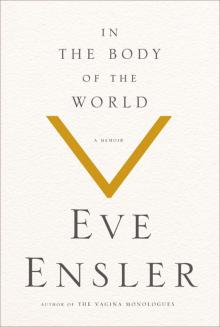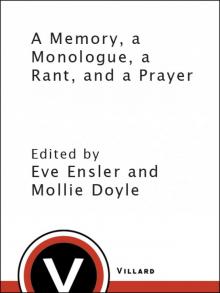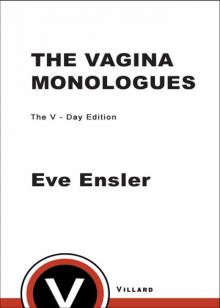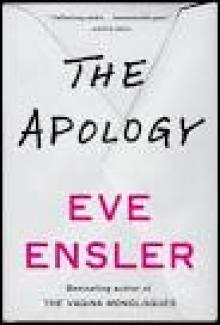- Home
- Eve Ensler
The Apology Page 2
The Apology Read online
Page 2
You are separated out from the beginning as special. You are there to serve the need of the person who adores you, the person who has made you into the adored object. And I was indeed an object. My mother’s adoration of me seemed to distance her from the object of her adoration, as if to touch me would diminish me. As if to treat me as a human would make me human. I don’t remember her ever holding me or cuddling me. I don’t remember her playing with me, chasing me, running on the green grass with me. I remember her directing me, correcting me, managing me, teaching me, shaping and constructing me. I ceased to be the subject of my life, rarely being allowed to feel sad or cry or misbehave.
My father, Hyman, was Austrian, and my mother, Sarah, was German. Both had been raised with the severest discipline. They were devotees of the practices of a well-known and highly popular German physician, Dr. Daniel Gottlob Moritz Schreber. Dr. Schreber strongly believed that babies should be taught from the outset to obey and should refrain from crying. The way to control a baby, he taught, was by frightening it, and after you would be master of the child forever. He strongly urged parents to refrain from physical demonstrations of affection like embracing, cuddling, or kissing.
The theory was that through withholding affection and inflicting terror and humiliation, children would obey authority figures and be deterred from acting from their own will. There were strict and detailed rules. The child would follow these and, like a wandering plant secured to a trellis, grow straight upward, climbing to the pinnacle of social and economic achievement and power.
Neither my mother nor father tolerated any digressions from their plans for me. As so many of their hopes rested with me, they were more severe with me than with their other children. I was their project. I was to be molded and perfected. My every move was monitored. You might say my mother was withholding or cold, but adulation is a powerful offering, an aphrodisiac. It fills you with a wildly enhanced version of yourself, charging you with a much-distorted and overblown confidence, an aggressive overdrive that never rests.
And inside, throughout all this, I felt plain, uninspired, and empty. But while my mother idealized me, my father saw me as lazy, pampered, unmotivated, coasting, unfocused, a loser of sorts. I felt much more aligned with his version of me. This would explain my endless anger. The divide between my mother’s version of me and who I actually thought myself to be confused and frustrated me. On one hand, the adoration was highly flattering and ego seducing, but on the other, my mother had no interest or ability to see me as I was, which meant she was not paying attention, was not really listening to or looking at me at all. She despised any indications of weakness or self-doubt. She had no time or patience for my childlike ways.
Then there were my sisters, Anna, Beatrice, and Rose. They were fifteen, fourteen, and thirteen years old when I was born. I was their adored toy. I was their trophy.
I could not shake the ever-present feeling that I was a fake and would soon be found out. I could not just be a normal little boy with wild and playful instincts, daydreams and mischievous delight. I lived inside an impossible pressure and pretense to measure up to this person with superhuman qualities, when I was racked with uncertainty and confusion and very human needs.
My already emerging grandiosity alienated me from other children. They found me arrogant and conceited. I was not a bully so much as an unbearable snob. There was essentially no one good enough to be my friend. My parents confirmed this any time I brought home anyone to play with. They were highly critical and contemptuous. This was deeply embarrassing, so I eventually stopped bringing other children home.
I became progressively isolated. I had no one to talk to, no one to share my doubts with, no one to play with, and no real connection to anyone outside this mythic construction of my family. This created a very distorted vision of myself and the world. The only real contact I had was with my older brother, Milton, who was eleven years my senior. I shared a room with him for a period of time. He was a deeply unhappy fellow and seemed to direct his frustration and jealousy toward his knighted brother. He had great contempt for me and seemed to delight in sadistic pleasures, constantly inventing bizarre tortures and terrors; waking me by putting drops of alcohol in my eyes, hiding red ants in my underwear, convincing me something was terribly wrong with the shape and size of my genitals. He would lock me in the closet for hours, tie me to the bedposts until my wrists were raw. I lived in the great fear that he would one day harm me greatly or perhaps even kill me. His torture was conducted in secrecy. There was no one to turn to, as reporting him would have made me seem weak and unable to fend for myself. He knew this, of course, and unchecked, his perversity advanced in new and more frightening forms. I suffered silently, steeling and sealing myself, knowing there was no place for any expression of vulnerability or fear. I learned to separate from the shame and terror by constructing an alternative persona. I developed the capacity to feel nothing. I learned how to disappear.
I imagine it was at this point that I closed off the valves of empathy, for to feel anyone else’s pain would have meant most surely to feel my own, and this was intolerable. The rage and terror I experienced on a daily basis were relieved through an obsessive fantasy life filled with visions of vengeance and destruction. My personality was molded on this fraught battleground. Deep in the center of me I became untouchable, and these endlessly played fantasies came to shape much of my later actions. No one would ever belittle, shame, or hurt me again. Not without the severest consequences. My isolation deepened as I grew into my teens, and that, with the onslaught of puberty, made me inordinately anxious, restless, and agitated. There was no place I could settle or relax inside or outside myself.
I was possessed by a demonic energy that I felt sure would lead me to violent crime, madness, or disaster. And perhaps I secretly wanted that, some crisis that would shatter and permanently eradicate this intolerable image, this absurd and overbearing idea of my superior perfection. It was through accidental fortune that on my seventeenth birthday, an uncle in show business offered to take me to my first moving picture. And it was there that a door opened and I found a way out of my misery. John Barrymore, Errol Flynn, Gary Cooper, Rudolph Valentino. Strikingly handsome, talented, but above all they were charming. Charming.
There on that huge screen I was introduced to the notion of charm. These men were able by their natural graces to please and seduce. They were able to hold their audience in rapt attention and fill them with deepest delight. Their control was effortless. It was as if they hypnotized their audiences simply by the inherent nature of their being. And it wasn’t just their striking looks. I was quite a handsome young man and it had brought me no success. No, these men of the screen were somehow able to energize and use their looks with a divinely inspired charisma. It was as if their beauty had wit, as if it were elevated by an intangible intoxicating energy—an enigmatic dynamism that lured you in and kept you longing, kept you crazy, kept you hooked.
I went to the movies at every opportunity. I studied these men. I absorbed their every move, their smiles, their clothes, their confidence, their way of entering a room, their way of captivating women. I began to move as they moved, pose as they posed. I perfected the off-the-cuff sweep of the hand through my casually elegantly groomed hair, the penetrating but mysterious stare across the room. I suddenly had an image that was mine, not my mother’s, an idea of who I wanted to be, and the image was all. I realized at that very young age that American culture was based on a picture, a fantasy. To succeed you needed to give yourself wholly to that creation.
Charm was my fortification. It served a dual purpose. It lured people in and it kept them excited and delighted long enough to come under my spell. Then, after, even when people felt demeaned or hurt or frightened by me, the charm confused them, but like a fly to honey, they clung to me in spite of their pain. My status among my peers transformed overnight from obscure to mysterious, from abhorred to imitated. I am not sure whether anyone, then or ever, really knew
or liked me (and in full honesty what was there to like?), but they followed me, they were in awe of me; they wanted to be near me and have whatever I had.
Of course, it was shimmering illusion, a chimera, but who cared? Charm took the ugly off my grandiosity. It sweetened the arrogance. I was no less a snob, but now people admired me for it, as it seem justified. In those years before meeting your mother, I perfected my performance, and indeed it seemed my whole life was a grand act. Somehow this shining new rendition of myself seemed to ward off my father’s harsh criticisms and contempt. He was impressed by my commitment to this new attitude, attire, and manner and suddenly had faith that I would indeed rise to be the golden boy he and my mother had dreamed of, bringing the family wealth and status. My sisters and mother became even more deeply enamored and devoted. I was the new American king, the pathway to a glamorous and glittering future for all. Even Milton, my vicious brother, was thrown off balance and seemed almost inspired by the entire effect. He gradually started to imitate my way of dressing and would sometimes accompany me to the movies.
The tortured and angry young man inside me was now firmly disguised, costumed in dashing handmade suits. He dressed in confidence and elegance and seemed, at least momentarily, to transform his enemies into admirers through style and charm. As you can imagine, this was a most synthetic remedy to what I can only identify now as soul sickness. I had been cast into the world as the exact opposite of the deep, reflective, philosophical man I had once dreamed of becoming. Instead I was becoming everything I secretly despised.
For I see now, after years of ceaseless self-obsession in the death realm, that there is no pain we can ever truly bury or avoid within ourselves. The tortured man I tried to leave behind would eventually surface. All the years of forcing him underground, all the sorrow and pain I ignored and did not care for, eventually metastasized into an entity and returned as a most terrifying fiend. He claimed my life then, and most regrettably, for the last thirty-one years he claimed my death in limbo. I realize I am speaking of him in the third person. I am by no means attempting to escape responsibility for his actions. It was more an indication of how profoundly detached I became from the person I shall call Shadow Man.
In the same way my parents had not seen or paid attention to the little boy I truly was, in the same way they idealized me and turned me into a king, I learned in turn to do the same thing to myself.
I became God in my own mind. I became all-powerful and perfect. Shadow Man had no place in that story. So I banished him the way I had been banished. If he was hurting, I became impatient with him and told him to snap out of it. If he was afraid or doubtful, I bullied him with merciless judgment. If the ragged edges of his low self-value surfaced, I dosed him with grandiose visions of my prowess and accomplishments. If he tried to remind me how far I had strayed from my spiritual longings, I shamed him into compliance by demeaning his impractical and nonsensical dreams and glorifying my rising fortune. I drank him away. I achieved him away. But all the while, Shadow Man plotted, seethed, and stewed. His sense of betrayal, his bitterness, his rage grew like volcanic lava bubbling beneath the surface of my skin. He would not emerge until much later. The ongoing friction caused by the growing disdain I had for myself combined with my arrogance and my utter inability and unwillingness to change my path assured a future in which I would become cruel and violent.
But Shadow Man would not emerge until much later. In those next years I built a life on charm, good looks, and snobbery. I moved in glamorous and fashionable crowds. I modeled for a time, and I was never seen in public without a bombshell actress or an elegant socialite on my arm. I was invited into the most exclusive clubs. I rose seemingly effortlessly to the top of society and the business world. The irony of course was that I despised those impostors and hypocrites who welcomed me and I had no interest in money. I found it beneath me and distasteful, merely a means to maintain my façade. But perhaps it was my very disdain for all of it that brought me fortune.
I’ve noticed that people often seem desperate for the person who has no interest in them. They gravitate toward the most critical and judgmental because that person confirms their deepest suspicion of being a worthless faker. I exploited this weakness to raise and sustain my position. People were intimidated by me, as they could sense my underlying contempt for their pathetic preoccupations. But my charm and looks distracted and drew them in. My life was a game to be mastered, a persona and an image to be styled and perfected. I was what was becoming known as a modern American man.
This is where your mother comes in. My playboy-bachelor days were beginning to sour—adorable rascal quickly descending into uncaring cad. I was close to fifty and had never had a relationship that lasted longer than a few months. I told myself and concerned others, particularly my older sisters, that I was holding out for “the one,” but in truth, I dreaded everything about the notion of marriage and family. To be cooped up in a house with a boring woman and nasty children in dreary routine was a paralyzing notion.
It was about this time that I met your mother. I wish I could tell you we fell madly in love, but that is not what happened. (Although you must know I came to love your mother dearly in my way.)
Ours was a different situation. Your mother was twenty years my junior, and her beauty and youth made a striking contrast and complement to this graying, dashing older man. She was a knockout—blond, shapely, young, and gorgeous, a head turner. She had the poise of the beautiful and the passivity of the one beheld. But what drew us to each other is that we recognized ourselves in each other.
We were escape artists, both of us fleeing the prison of our stultifying pasts, the suffocation of our families, and various aspects of our uneven personalities. And we were self-made products—your mother, attempting to erase all signs of a poor, rural Midwestern upbringing, dyed her hair blond, changed her name, and fashioned a style and personality from studying divas in the movies. We were two solo performers who joined our strength in a crowd-pleasing duet, Arthur and Chris. We did everything but dance. So when people later made constant reference to us as Cary Grant and Doris Day, we knew we had arrived. We were pure invention, confection. We existed only in performance, and in those early years, our act was working.
We dined and traveled in New York City’s most celebrated circles, our lives lubricated with very dry martinis. By then I had risen in the ranks of the ice cream company to a significant position. We dressed for our parts; we learned our lines and witty retorts. We had no idea who we were, and we most certainly knew nothing about each other. We didn’t talk deeply when alone: our commitment was to a social rising concealed beneath a highly fashioned impenetrable veneer. We were curated mysteries, charming, evocative, with no entrance in.
For our first years, that worked fine for both of us. We had wealth and charm and looks and status and booze. Our sex was perfunctory, a performance too. Though perhaps that is more than you want to know. Our marriage was an equitable arrangement to elevate and sustain our position and power. A small business. I was the CEO and she my secretary. However, my grandiosity eventually got the better of me. How could I, with my superior character and wit, not continue such a legacy? How could I, with such charm and looks and intelligence, not reproduce? But if I’m honest, I don’t think your mother and I thought of children as anything more than props for our evolving lifestyle.
From a young age I had always had a terrible feeling about having children. Some eerie sense that they would hurl me into unforeseen disaster. As an adult I had an allergy to them and they to me. Children were disturbingly foreign and terrifyingly familiar to me. On the surface they annoyed and irritated me, but the rub was much deeper. As it happened, having children was the catalyst for the return of Shadow Man. And I know now that my instinct not to have offspring was correct.
I had never been allowed to be a child. Children were undeniable evidence of who I had once been: vulnerable, needy, uncontrollable, messy, alive. They evoked unbearable absence in me
, unbearable longing and feelings of deepest betrayal. They evoked a murderous rage. I despised their endless neediness because they dredged up my own.
But it was your birth, Evie, your arrival, that spun me into deepest bewilderment and distraction. Nothing had prepared me for the tenderness of you. Nothing had prepared me for the tenderness you would evoke in me. In your very early years I could not trust myself with you. Each time I held you in my arms, felt the soft flesh of your warm baby girl body, each time your little fingers wrapped tight around my grown man fingers, a surging pulse would rush through my whole body. The fire of this connection was a more compelling sensation than anything I had ever felt. More electrifying than winning the job of CEO, more erotic than orgasm, more ecstatic than deepest prayer. This energy filled every cell of my being. It called me out of myself.
No one had ever spoken of such feelings. I had no idea I would feel this way for my baby daughter. I did not know love. I had never been loved. I had been adored. I had been idolized. I had been savior. I had not tasted the honeyed milk of my mother’s breast, nurturing and filling my soul and cells. My body had no way to receive or hold such sweet elation.
Each time I would venture toward your little body, I would find myself paralyzed, terrorized, filled with dread. Your mother found it comical and typical of men of my generation who were afraid of the foreignness and fragility of babies. But it was not that at all. How could I tell your mother that the touch of your new skin threw me into spasms of frenzy and fervor unlike anything I had ever experienced with her or any woman? That your tender essence had flung open the steel locker in my heart and loins and that I was possessed with an all-consuming desire that filled my days and nights with bliss and agony. How could I tell her that you were all I craved, that no other touch would ever be your touch, no sweetness would taste as sweet? I had betrayed her already.

 In the Body of the World
In the Body of the World A Memory, a Monologue, a Rant, and a Prayer
A Memory, a Monologue, a Rant, and a Prayer The Vagina Monologues
The Vagina Monologues The Apology
The Apology